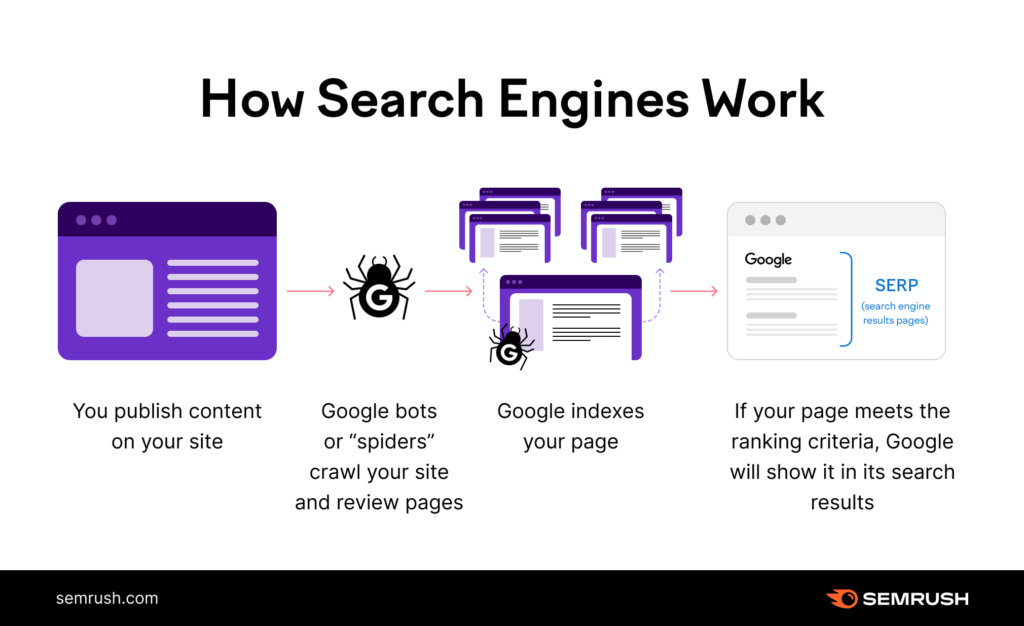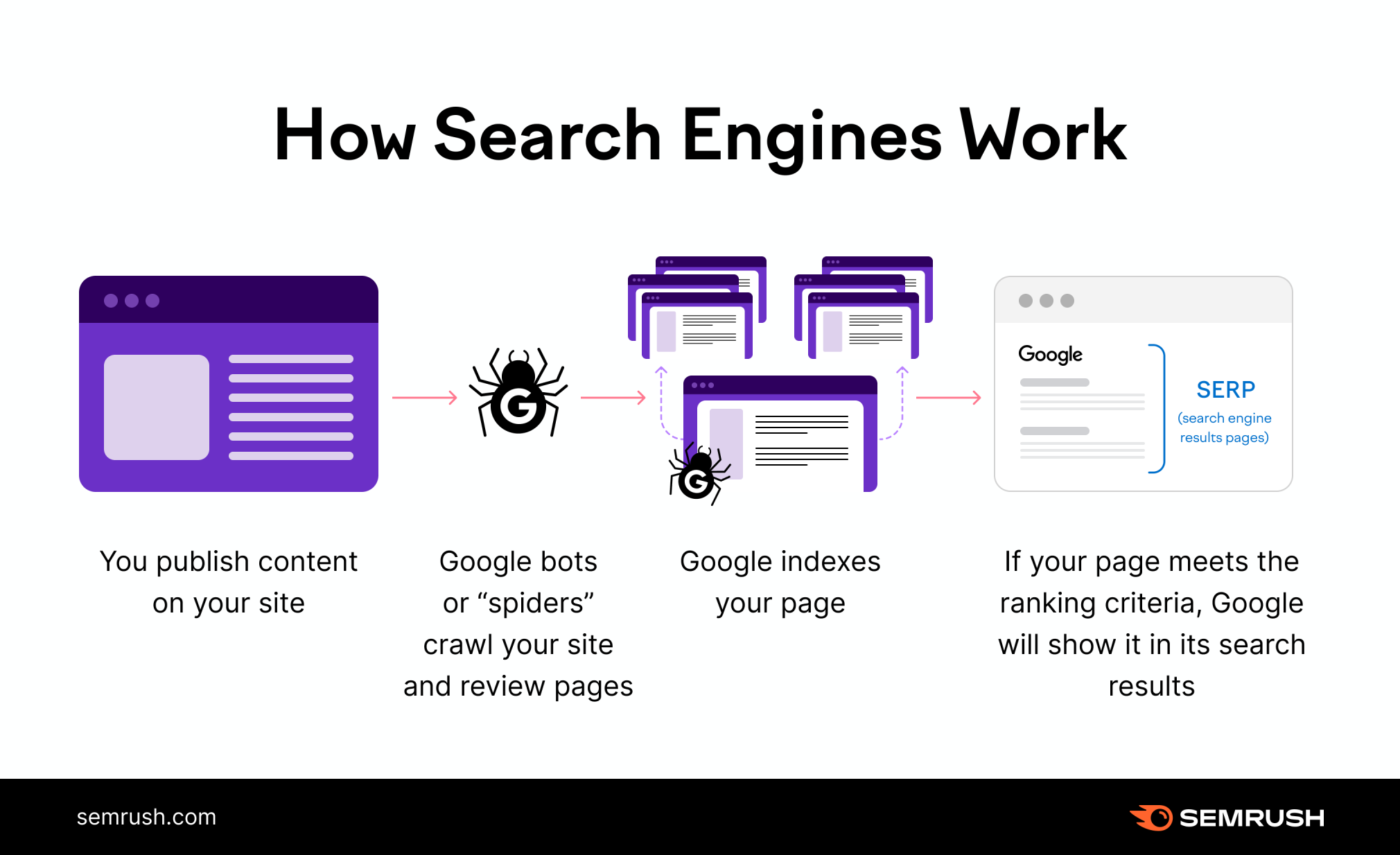
The Inner Workings of a Search Engine: A Comprehensive Guide
In today’s digital age, search engines are indispensable tools. They act as the gateway to a vast ocean of information, enabling users to find answers, products, and services with remarkable speed and efficiency. But have you ever stopped to consider what happens behind the scenes when you type a query into Google, Bing, or any other search engine? Understanding the working of search engine is crucial for anyone involved in online marketing, content creation, or simply navigating the internet effectively. This article will delve into the intricate processes that power these powerful platforms, demystifying the technology and revealing how they deliver relevant results.
Crawling: Discovering the Web’s Vast Landscape
The first step in the working of a search engine is crawling. Search engines employ automated programs called ‘crawlers’ or ‘spiders’ that systematically browse the internet. These crawlers follow links from one webpage to another, discovering new content and updating existing information. Think of it as a massive digital scavenger hunt, where the crawlers are constantly seeking out the latest and greatest additions to the web. [See also: How to Optimize Your Website for Crawlers]
The process begins with a seed list of URLs. These URLs are websites that the search engine already knows about. The crawler visits these websites and extracts all the links it finds. It then adds these new links to its queue of URLs to crawl. This process continues indefinitely, allowing the search engine to discover and index a vast amount of content. The frequency with which a crawler visits a website depends on factors such as the website’s popularity and how often its content is updated.
Indexing: Organizing the Web’s Information
Once a crawler has discovered a webpage, the next step is indexing. Indexing involves analyzing the content of the webpage and storing it in a massive database called an index. This index is essentially a giant library of information about the web. The index allows the search engine to quickly retrieve relevant results when a user performs a search. [See also: The Importance of a Well-Structured Website]
During the indexing process, the search engine analyzes various elements of the webpage, including the text, images, videos, and metadata. It identifies keywords, phrases, and other important information that describe the content of the page. This information is then stored in the index, along with the URL of the webpage. The search engine also considers factors such as the website’s structure, its loading speed, and its mobile-friendliness when indexing a webpage.
Ranking: Delivering Relevant Results
The final step in the working of a search engine is ranking. When a user performs a search, the search engine consults its index to find webpages that are relevant to the search query. It then ranks these webpages in order of relevance, based on a complex algorithm. This algorithm takes into account a variety of factors, including the keywords in the search query, the content of the webpage, the website’s authority, and the user’s location and search history. [See also: Understanding Search Engine Ranking Factors]
The search engine‘s ranking algorithm is constantly evolving, as the search engine strives to provide the most relevant and useful results to its users. Search engines use machine learning and artificial intelligence to analyze user behavior and improve their ranking algorithms. They also conduct experiments to test different ranking factors and determine which ones are most effective. The goal is to deliver results that are not only relevant but also trustworthy and authoritative. The ability of a search engine to accurately and efficiently rank results is what sets it apart from its competitors.
Key Factors Influencing Search Engine Rankings
Several factors influence how a search engine ranks webpages. These factors can be broadly categorized into on-page and off-page factors.
On-Page Factors
On-page factors are elements that you can control directly on your website. These include:
- Keyword Optimization: Using relevant keywords in your title tags, meta descriptions, headings, and body content.
- Content Quality: Creating high-quality, informative, and engaging content that meets the needs of your audience.
- Website Structure: Ensuring that your website is well-organized and easy to navigate.
- Mobile-Friendliness: Making sure that your website is responsive and accessible on all devices.
- Page Speed: Optimizing your website for fast loading times.
Off-Page Factors
Off-page factors are elements that are external to your website. These include:
- Backlinks: Earning links from other reputable websites.
- Social Signals: Generating social media engagement for your content.
- Brand Mentions: Getting your brand mentioned on other websites and in online publications.
- Online Reviews: Receiving positive reviews on online review platforms.
The Future of Search Engines
Search engines are constantly evolving, driven by advancements in technology and changes in user behavior. Some of the key trends shaping the future of search engines include:
- Artificial Intelligence: Search engines are increasingly using AI to understand user intent and deliver more personalized results.
- Voice Search: With the rise of voice assistants like Siri and Alexa, voice search is becoming increasingly popular.
- Mobile Search: Mobile search is now the dominant form of search, and search engines are prioritizing mobile-friendly websites.
- Visual Search: Visual search, which allows users to search using images, is gaining traction.
Understanding the working of search engine is essential for navigating the online world effectively. By understanding how search engines crawl, index, and rank webpages, you can optimize your website and content to improve your visibility and reach a wider audience. As search engines continue to evolve, it is important to stay up-to-date on the latest trends and best practices. The core function of a search engine remains unchanged: connecting users with the information they need, quickly and efficiently.
The advancements in search engine technology have made accessing information easier than ever before. From simple keyword searches to complex queries involving natural language processing, search engines are becoming increasingly sophisticated in their ability to understand and respond to user needs. This evolution is driven by the constant pursuit of relevance and accuracy, as search engines strive to deliver the best possible search experience. The intricate process of the working of search engine ensures that users can find the information they seek, no matter how specific or obscure their query may be.
Ultimately, the working of search engine is a complex and dynamic process that is constantly evolving to meet the changing needs of users. By understanding the fundamentals of how search engines work, you can gain a competitive edge in the online world and effectively leverage these powerful tools to achieve your goals. Whether you are a business owner, a marketer, or simply an internet user, a solid understanding of the working of search engine is an invaluable asset.

